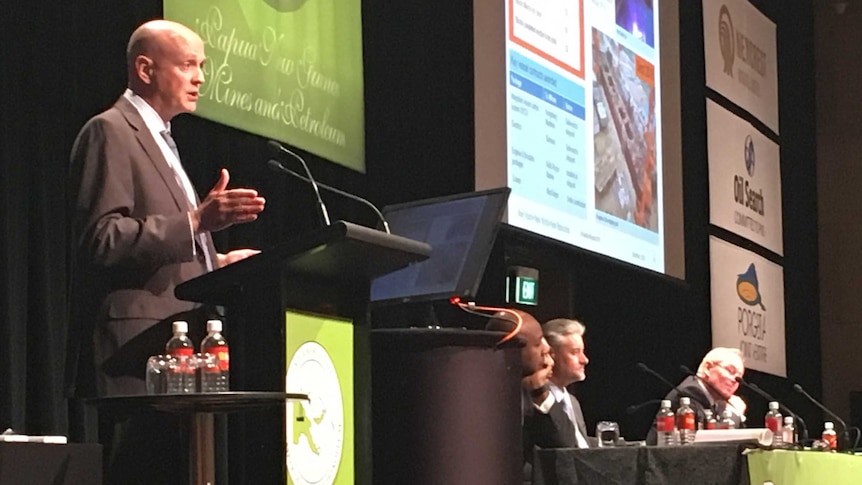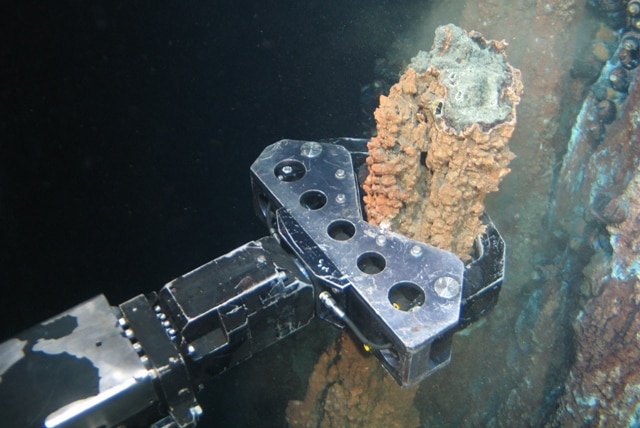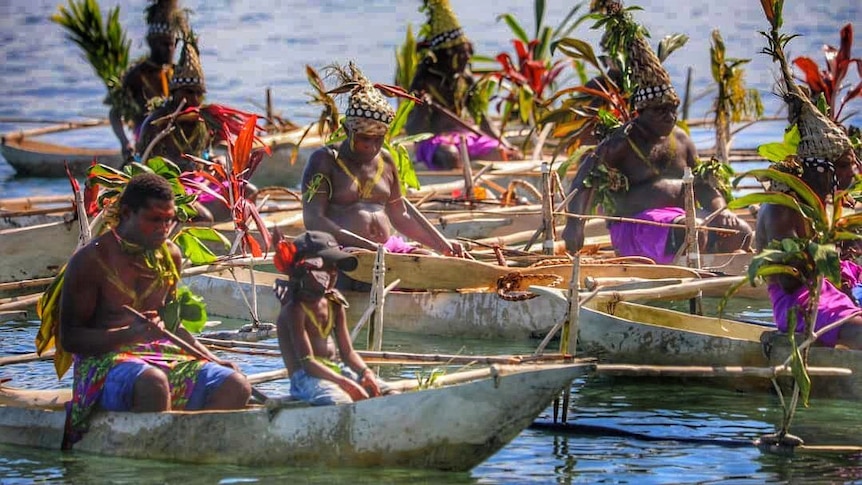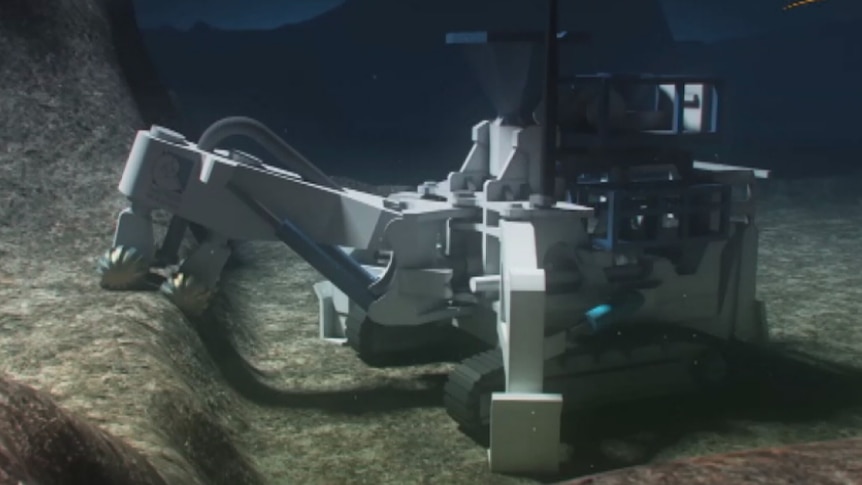Polymetallic nodules, grow with the help of microbes over millions of years around a kernel of organic matter.(Reuters: Chris Helgren)
A handful of postage-stamp nations in the South Pacific have launched an uphill battle against the deep-sea mining of unattached, fist-sized rocks rich in rare earth metals.
Key points:Mining of the ocean floor may harvest precious materials used to build batteries for electric vehicles
But the extraction process would disfigure the ecosystem and take thousands of years to repair
Commercial mining has not started anywhere in the world and several countries have called for an open-ended moratorium
A handful of postage-stamp nations in the South Pacific have launched an uphill battle against the deep-sea mining of unattached, fist-sized rocks rich in rare earth metals.
Key points:Mining of the ocean floor may harvest precious materials used to build batteries for electric vehicles
But the extraction process would disfigure the ecosystem and take thousands of years to repair
Commercial mining has not started anywhere in the world and several countries have called for an open-ended moratorium
The stakes are potentially enormous.
Companies keen to scrape the ocean floor 5,000 to 6,000 metres below sea level stand to earn billions harvesting manganese, cobalt, copper and nickel currently used to build batteries for electric vehicles.
But the extraction process would disfigure what may be the most pristine ecosystem on the planet and could take millennia, if not longer, for nature to repair.
The deep-sea jewels in question, called polymetallic nodules, grow with the help of microbes over millions of years around a kernel of organic matter, such as a shark's tooth or the ear-bone of a whale.
"They are living rocks, not just dead stones," former US National Oceanic and Atmospheric Administration (NOAA) chief scientist Sylvia Earle said in Lisbon.
"I look at them as miracles."
PNG seabed mining
The world's first project to mine the seabed for minerals is expected to begin operations in Papua New Guinea in early 2019.

Companies keen to scrape the ocean floor 5,000 to 6,000 metres below sea level stand to earn billions harvesting manganese, cobalt, copper and nickel currently used to build batteries for electric vehicles.
But the extraction process would disfigure what may be the most pristine ecosystem on the planet and could take millennia, if not longer, for nature to repair.
The deep-sea jewels in question, called polymetallic nodules, grow with the help of microbes over millions of years around a kernel of organic matter, such as a shark's tooth or the ear-bone of a whale.
"They are living rocks, not just dead stones," former US National Oceanic and Atmospheric Administration (NOAA) chief scientist Sylvia Earle said in Lisbon.
"I look at them as miracles."
PNG seabed mining
The world's first project to mine the seabed for minerals is expected to begin operations in Papua New Guinea in early 2019.
Read more
An incipient deep-sea mining industry also sees them as miraculous, though for different reasons.
"High grades of four metals in a single rock means that four times less ore needs to be processed to obtain the same amount of metal," notes The Metals Company, which has formed exploratory partnerships with three South Pacific nations — Nauru, Kiribati and Tonga — in the mineral-rich Clarion-Clipperton fracture zone.
Nodules also have low levels of heavy elements, which means less toxic waste compared to land-based extraction, according to the company.
Commercial mining has not started anywhere in the world, but about 20 research institutes or companies hold exploration contracts with the International Seabed Authority (ISA) in the Indian, Pacific and Atlantic oceans.


But in Lisbon, explicit support from other countries for a temporary ban on ocean-floor mining on the high seas, outside of national territorial waters known as exclusive economic zones (EEZs), was scarce.
Chile stepped up, calling for a 15-year pause to allow for more research.
The United States, along with other developed nations, took a more ambiguous stance, calling for scientific evaluation of environmental impacts but not closing the door to future mining.
"We haven't taken an official position on it," US climate envoy John Kerry told AFP in an interview.
"But we have expressed deep concerns about adequately researching the impacts of any deep-sea mining, and we have not approved any."
To the surprise of many in Lisbon, France's President Emmanuel Macron appeared to endorse a halt to deep-sea mining on the seas, despite the fact that France holds mining exploration licenses from ISA, the intergovernmental body overseeing exploitation of the ocean floor.
"I think we have, indeed, to create the legal framework to stop the high-sea mining and not to allow new activities putting in danger these ecosystems," Mr Macron said at a side event.
"We have to promote our scientists and explorers to better know and discover these high seas."
Concerns over deep sea mine
A plan to plough the sea floor off PNG for gold and copper faces claims it will lead to species extinction.

Deep-sea mining opponents were thrilled with the statement, but are waiting to see what follows.
"Is the French government going to put in the diplomatic effort in order to make what he said they'll do actually happen? We'll see," said Matthew Gianni, co-founder of Deep Sea Conservation Coalition.
The clock is ticking because last year Nauru, in cooperation with The Metals Company, triggered a rule requiring the ISA to finalise regulations for high-seas mining worldwide within two years.
The ISA, criticised for lacking transparency and favouring corporate interests, meets later this month in Kingston, Jamaica.
Sources say they are likely to try to push through draft regulations which, if adopted, could see mining operations licensed by this time next year.
ABC/wires
An incipient deep-sea mining industry also sees them as miraculous, though for different reasons.
"High grades of four metals in a single rock means that four times less ore needs to be processed to obtain the same amount of metal," notes The Metals Company, which has formed exploratory partnerships with three South Pacific nations — Nauru, Kiribati and Tonga — in the mineral-rich Clarion-Clipperton fracture zone.
Nodules also have low levels of heavy elements, which means less toxic waste compared to land-based extraction, according to the company.
Commercial mining has not started anywhere in the world, but about 20 research institutes or companies hold exploration contracts with the International Seabed Authority (ISA) in the Indian, Pacific and Atlantic oceans.
A remotely operated vehicle takes a rock sample underwater.(Supplied: Nautilus Minerals)
Surangel Whipps Jr, president of Palau, kicked off the anti-mining campaign at the just-concluded UN Ocean Conference in Lisbon, flanked by Fiji Prime Minister Frank Bainimarama.
"Deep-sea mining compromises the integrity of our ocean habitat and should be discouraged to the greatest extent possible," Mr Whipps said, calling for an open-ended moratorium.
Like-minded neighbouring nation states Samoa, Tuvalu and the Solomon Islands have backed the call, along with more than 100 mostly green party legislators from three dozen nations across the world.
A similar motion put to a vote last September before the International Union for the Conservation of Nature (IUCN) — an umbrella organisation of 1,400 research institutes, environmental NGOs and indigenous groups — passed easily.
Explicit support for a ban is scarce
"Mining, wherever it occurs, is well known to have environmental costs," said Ms Earle, the scientist.
"On the land at least we can monitor, see and fix problems, and minimise the damage. Six thousand metres beneath the surface, who's watching?"
PNG's shark callers
Shark callers head into the sea in wooden canoes to beckon sharks and kill them. But a new mining practice threatens their ancient traditions.
Surangel Whipps Jr, president of Palau, kicked off the anti-mining campaign at the just-concluded UN Ocean Conference in Lisbon, flanked by Fiji Prime Minister Frank Bainimarama.
"Deep-sea mining compromises the integrity of our ocean habitat and should be discouraged to the greatest extent possible," Mr Whipps said, calling for an open-ended moratorium.
Like-minded neighbouring nation states Samoa, Tuvalu and the Solomon Islands have backed the call, along with more than 100 mostly green party legislators from three dozen nations across the world.
A similar motion put to a vote last September before the International Union for the Conservation of Nature (IUCN) — an umbrella organisation of 1,400 research institutes, environmental NGOs and indigenous groups — passed easily.
Explicit support for a ban is scarce
"Mining, wherever it occurs, is well known to have environmental costs," said Ms Earle, the scientist.
"On the land at least we can monitor, see and fix problems, and minimise the damage. Six thousand metres beneath the surface, who's watching?"
PNG's shark callers
Shark callers head into the sea in wooden canoes to beckon sharks and kill them. But a new mining practice threatens their ancient traditions.
But in Lisbon, explicit support from other countries for a temporary ban on ocean-floor mining on the high seas, outside of national territorial waters known as exclusive economic zones (EEZs), was scarce.
Chile stepped up, calling for a 15-year pause to allow for more research.
The United States, along with other developed nations, took a more ambiguous stance, calling for scientific evaluation of environmental impacts but not closing the door to future mining.
"We haven't taken an official position on it," US climate envoy John Kerry told AFP in an interview.
"But we have expressed deep concerns about adequately researching the impacts of any deep-sea mining, and we have not approved any."
To the surprise of many in Lisbon, France's President Emmanuel Macron appeared to endorse a halt to deep-sea mining on the seas, despite the fact that France holds mining exploration licenses from ISA, the intergovernmental body overseeing exploitation of the ocean floor.
"I think we have, indeed, to create the legal framework to stop the high-sea mining and not to allow new activities putting in danger these ecosystems," Mr Macron said at a side event.
"We have to promote our scientists and explorers to better know and discover these high seas."
Concerns over deep sea mine
A plan to plough the sea floor off PNG for gold and copper faces claims it will lead to species extinction.
Deep-sea mining opponents were thrilled with the statement, but are waiting to see what follows.
"Is the French government going to put in the diplomatic effort in order to make what he said they'll do actually happen? We'll see," said Matthew Gianni, co-founder of Deep Sea Conservation Coalition.
The clock is ticking because last year Nauru, in cooperation with The Metals Company, triggered a rule requiring the ISA to finalise regulations for high-seas mining worldwide within two years.
The ISA, criticised for lacking transparency and favouring corporate interests, meets later this month in Kingston, Jamaica.
Sources say they are likely to try to push through draft regulations which, if adopted, could see mining operations licensed by this time next year.
ABC/wires

No comments:
Post a Comment